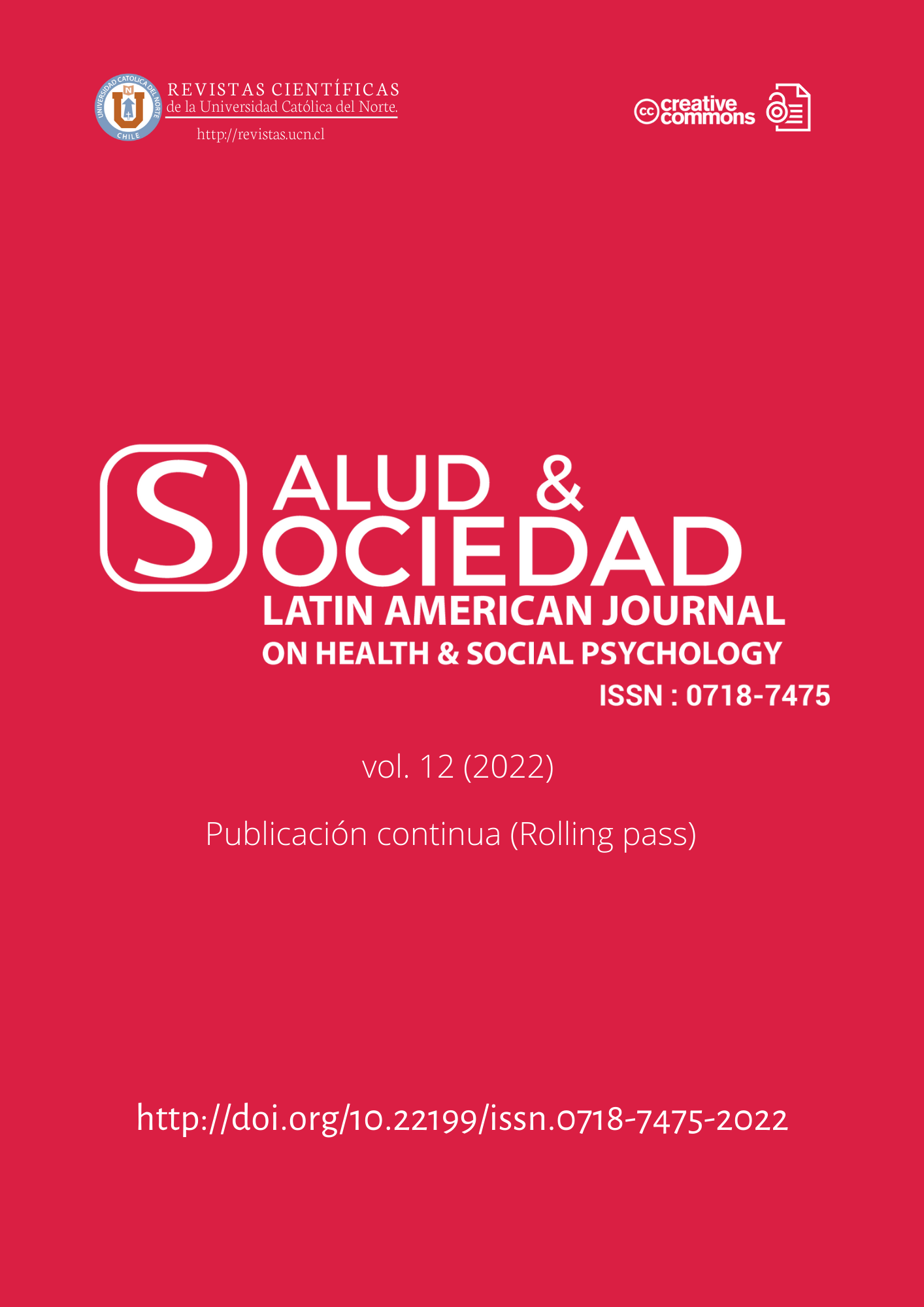Brief resilience scale
ampliando suas evidências psicométricas em contexto brasileiro
DOI:
https://doi.org/10.22199/issn.0718-7475-4950Keywords:
Resilience; mental health; scale; psychometrics.Abstract
Resilience describes the individual's ability to adapt positively to adversities and stressors in life. Considering the importance of the construct for people's physical and mental health, its proper assessment is a primary concern among researchers. In the present study (N = 591), we gathered additional evidence for the Brief Resilience Scale (BRS). More specifically, replicating the validity evidence based on the internal structure, corroborating its unidimensionality, in addition to expanding the validity evidence based on correlations with external variables (e.g., depression, anxiety, optimism, positive and negative affects). Furthermore, we observed that the BRS is a robust measure, having discriminative items, which required moderate and high levels of resilience for its endorsement, in addition to being an informative scale, covering a wide range of the latent trait. Overall, the results indicate that this is a psychometrically adequate measure, being brief and easy to administer, recommended in research where a quick and effective assessment of resilience is required.
Downloads
References
Angst, R. (2009). Psicologia e resiliência: uma revisão de literatura. Psicologia Argumento, 27, 253-260. https://bit.ly/3hgoCGm
Araújo, L. F., Teva, I., & Bermúdez, M. D. L. P. (2015). Resiliencia en adultos: Una revisión teórica. Terapia Psicológica, 33(3), 257-276. http://doi.org/10.4067/S0718-48082015000300009
Asparouhov, T., & Muthen, B. (2010). Simple second order Chi-square correction. Manuscrito não publicado. https://bit.ly/3HsDtZ3
Baker, F.B. (2001). The Basics of Item Response Theory. Washington, DC: ERIC Clearinghouse on Assessment and Evaluation.
Barzilay, R., Moore, T. M., Greenberg, D. M., DiDomenico, G. E., Brown, L. A., White, L. K., ... & Gur, R. E. (2020). Resilience, COVID-19-related stress, anxiety and depression during the pandemic in a large population enriched for healthcare providers. Translational Psychiatry, 10, 1-8. https://doi.org/10.1038/s41398-020- 00982-4
Bedewy, D., & Gabriel, A. (2015). Examining perceptions of academic stress and its sources among university students: The Perception of Academic Stress Scale. Health Psychology Open, 2, 1–9. https://doi.org/10.1177/2055102915596 714
Bonanno, G. A. (2004). Loss, trauma, and human resilience: have we underestimated the human capacity to thrive after extremely aversive events? American Psychologist, 59, 20-28. https://doi.org/10.1037/0003- 066X.59.1.20
Bonanno, G. A. (2005). Resilience in the face of potential trauma. Current Directions in Psychological Science, 14, 135-138. https://doi.org/10.1111/j.0963-7214.2005.00347.x
Borsa, J. C., Rodrigues, A. J. N., Bienemann, B., & Damásio, B. F. (2017). Escala de Positividade: evidências iniciais de valideae para adolescentes brasileiros. Avaliação Psicológica, 16(3), 301-309. http://doi.org/10.15689/ap.2017.1603.1 2472
Caprara, G. V., Alessandri, G., Eisenberg, N., Kupfer, A., Steca, P., Caprara, M. G., Abela, J. (2012). The Positivity Scale. Psychological Assessment, 24, 701- 712. http://dx.doi.org/10.1037/a0026681
Chalmers, R. P. (2012). Mirt: A multidimensional item response theory package for the R environment. Journal of Statistical Software, 48(6), 1-29. https://bit.ly/3UTNOAi
Chmitorz, A., Kunzler, A., Helmreich, I., Tüscher, O., Kalisch, R., Kubiak, T., ... & Lieb, K. (2018). Intervention studies to foster resilience–A systematic review and proposal for a resilience framework in future intervention studies. Clinical Psychology Review, 59, 78-100. https://doi.org/10.1016/j.cpr.2017.11.002
Chmitorz, A., Wenzel, M., Stieglitz, R. D., Kunzler, A., Bagusat, C., Helmreich, I., ... & Tüscher, O. (2018). Populationbased validation of a German version of the Brief Resilience Scale. PloS One, 13, e0192761. https://doi.org/10.1371/journal.pone.0192761
Coelho, G. L. H., Hanel, P. H., Cavalcanti, T. M., Rezende, A. T., & Gouveia, V. V. (2016). Brief Resilience Scale: Testing its factorial structure and invariance in Brazil. Universitas Psychologica, 15(2), 397-408.
Coelho, G. L., Vilar, R., Hanel, P. H., Monteiro, R. P., Ribeiro, M. G., & Gouveia, V. V. (2018). Optimism scale: Evidence of psychometric validity in two countries and correlations with personality. Personality and Individual Differences, 134, 245-251. https://doi.org/10.1016/j.paid.2018.06.030
Connor, K. M., & Davidson, J. R. (2003). Development of a new resilience scale: The Connor-Davidson resilience scale (CD-RISC). Depression and Anxiety, 18(2), 76-82. https://doi.org/10.1002/da.10113
Diener, E. D., Emmons, R. A., Larsen, R. J., & Griffin, S. (1985). The satisfaction with life scale. Journal of Personality Assessment, 49(1), 71-75. https://doi.org/10.1207/s15327752jpa49 01_13
Ferrando, P. J., & Lorenzo-Seva, U. (2018). Assessing the quality and appropriateness of factor solutions and factor score estimates in exploratory item factor analysis. Educational and Psychological Measurement, 78(5), 762–780. https://doi.org/10.1177/0013164417719308
França, F. D. P., & Dias, T. L. (2021). Validity and reliability of the perceptions of academic stress scale. Psicologia: Teoria e Prática, 23(1), 01-21. http://dx.doi.org/10.5935/1980-6906/ePTPPA13041
Friborg, O., Hjemdal, O., Rosenvinge, J. H., & Martinussen, M. (2003). A new rating scale for adult resilience: what are the central protective resources behind healthy adjustment? International Journal of Methods in Psychiatric Research, 12(2), 65-76. https://doi.org/10.1002/mpr.143
Gerino, E., Rollè, L., Sechi, C., & Brustia, P. (2017). Loneliness, resilience, mental health, and quality of life in old age: A structural equation model. Frontiers in Psychology, 14, 2003. https://doi.org/10.3389/fpsyg.2017.02003
Goldberg, D. P. (1972). The Detection of Psychiatric Illness by Questionnaire. Oxford University Press: London. Gouveia, V. V., Barbosa, G. A., Andrade, E. D. O., & Carneiro, M. B. (2005). Medindo a satisfação com a vida dos médicos no Brasil. Jornal Brasileiro de Psiquiatria, 54, 298-305. https://bit.ly/3PfINkt
Gouveia, V. V., Araújo, R. C. R., Oliveira, I. C. V., Gonçalves, M. P., Milfont, T., Coelho, G. L. H., ... & Gouveia, R. (2021). A Short Version of the Big Five Inventory (BFI-20): Evidence on Construct Validity. Revista Interamericana de Psicología, 55(1). https://doi.org/10.30849/ripijp.v55i1.1312
Gouveia, V. V., Ribeiro, M. G. C., Loureto, G. D. L., Silva Neta, O. F. D., Gouveia, R. S., Vilar, R., & Freire, S. E. D. A. (2019). Scale of Positive and Negative Affects (EAPN-10): Evidence of its psychometric adequacy. Trends in Psychology, 27(1), 189-203. https://doi.org/10.9788/TP2019.1-14
Grevenstein, D., Aguilar-Raab, C., Schweitzer, J., & Bluemke, M. (2016). Through the tunnel, to the light: Why sense of coherence covers and exceeds resilience, optimism, and selfcompassion. Personality and Individual Differences, 98, 208-217. https://doi.org/10.1016/j.paid.2016.04.001
Hu, T., Zhang, D., & Wang, J. (2015). A metaanalysis of the trait resilience and mental health. Personality and Individual Differences, 76, 18-27. https://doi.org/10.1016/j.paid.2014.11.039
Killgore, W. D., Taylor, E. C., Cloonan, S. A., & Dailey, N. S. (2020). Psychological resilience during the COVID-19 lockdown. Psychiatry Research, 291, 113216. https://doi.org/10.1016/j.psychres.2020.113216
Konaszewski, K., Niesiobędzka, M., & Surzykiewicz, J. (2020). Validation of the Polish version of the Brief Resilience Scale (BRS). PloS One, 15, e0237038. https://doi.org/10.1371/journal.pone.0237038
Koral, L., & Cirak, Y. (2021). The relationships between fear of cancer recurrence, spiritual well-being and psychological resilience in nonmetastatic breast cancer survivors during the COVID-19 outbreak. PsychoOncology. https://doi.org/10.1002/pon.5727
Lorenzo-Seva, U., & Ferrando, P. J. (2013). Factor 9.2 a comprehensive program for fitting exploratory and semiconfirmatory factor analysis and IRT models. Applied Psychological Measurement, 37, 497- 498. http://doi.org/10.1177/0146621613487794
Lorenzo-Seva, U., Timmerman, M. E., & Kiers, H. A. (2011). The Hull method for selecting the number of common factors. Multivariate Behavioral Research, 46, 340–364. https://doi.org/10.1080/00273171.2011.564527
Lovibond, P. F., & Lovibond, S. H. (1995). The structure of negative emotional states: Comparison of the Depression Anxiety Stress Scales (DASS) with the Beck Depression and Anxiety Inventories. Behaviour Research and Therapy, 33(3), 335-343. https://doi.org/10.1016/0005-7967(94)00075-U
Mancini, A. D., & Bonanno, G. A. (2006). Resilience in the face of potential trauma: Clinical practices and illustrations. Journal of Clinical Psychology, 62, 971-985. https://doi.org/10.1002/jclp.20283
Monteiro, R. P., & Gouveia, V. V. (2019). Versão de 12 itens da Depression Stress and Anxiety Scale (DASS-12). Manuscrito em preparação. Oliveira, K. S., & Nakano, T. C. (2018). Avaliação da resiliência em Psicologia: revisão do cenário científico brasileiro. Revista Psicologia em Pesquisa, 12, 1- 11, https://doi.org/10.24879/2018001200100283
Pedrosa, I., Celis-Atenas, K., SuárezÁlvarez, J., García-Cueto, E., & Muñiz, J. (2015). Cuestionario para la evaluación del optimismo: Fiabilidad y evidencias de validez. Terapia Psicológica, 33(2), 127-138. http://dx.doi.org/10.4067/S0718-48082015000200007
Perim, P. C., Dias, C. S., Corte-Real, N. J., Andrade, A. L., & Fonseca, A. M. (2015). Análise fatorial confirmatória da versão Brasileira da Escala de Resiliência (ERBrasil). Gerais: Revista Interinstitucional de Psicologia, 8(2), 373-384. https://bit.ly/3BmCJRt
Pesce, R. P., Assis, S. G., Avanci, J. Q., Santos, N. C., Malaquias, J. V., & Carvalhaes, R. (2005). Adaptação transcultural, confiabilidade e validade da escala de resiliência. Cadernos de Saúde Pública, 21(2), 436-448. https://bit.ly/2I0662N
Poletto, M., & Koller, S. H. (2008). Contextos ecológicos: promotores de resiliência, fatores de risco e de proteção. Estudos de Psicologia (Campinas), 25(3), 405- 416. https://doi.org/10.1590/S0103-166X2008000300009
Rodríguez-Rey, R., Alonso-Tapia, J., & Hernansaiz-Garrido, H. (2016). Reliability and validity of the Brief Resilience Scale (BRS) Spanish Version. Psychological Assessment, 28(5), 101-110. https://doi.org/10.1037/pas0000191
Rooke, M. I. (2015). Aspectos conceituais e metodológicos da resiliência psicológica: uma análise da produção científica brasileira. Estudos e Pesquisas em Psicologia, 15(2), 671-687. Retirado de https://bit.ly/3hkOUaD
Saleem, M., Dastgeer, S., Durrani, A. K., Saad, A. A., Manzoor, Z., & Hussain, H. N. (2020). Self-control mediates the relationship between psychosocial strengths and perceived severity of COVID-19 among frontline healthcare professionals of Pakistan: A single center experience. Pakistan Journal of Medical Sciences, 36, 1-5. https://doi.org/10.12669/pjms.36.COVID19-S4.2662
Sánchez, J., Estrada-Hernández, N., Booth, J., & Pan, D. (2021). Factor structure, internal reliability, and construct validity of the Brief Resilience Scale (BRS): A study on persons with serious mental illness living in the community. Psychology and Psychotherapy: Theory, Research and Practice, 94(3), 620-645. https://doi.org/10.1111/papt.12336
Sarriera, J. C., Schwarcz, C., & Câmara, S. G. (1996). Bem-estar psicológico: Análise fatorial da escala de Goldberg (GHQ-12) numa amostra de jovens. Psicologia: Reflexão e Crítica, 9, 293- 306. Sarubin, N., Wolf, M., Giegling, I., Hilbert, S., Naumann, F., Gutt, D., ... & Padberg, F. (2015). Neuroticism and extraversion as mediators between positive/negative life events and resilience. Personality and Individual Differences, 82, 193-198. https://doi.org/10.1016/j.paid.2015.03.028
Seiler, A., & Jenewein, J. (2019). Resilience in cancer patients. Frontiers in Psychiatry, 10, 208. https://doi.org/10.3389/fpsyt.2019.00208
Silva-Sauer, L., de la Torre-Luque, A., Smith, B. W., CMC Lins, M., Andrade, S., & Fernández-Calvo, B. (2020). Brief Resilience Scale (BRS) Portuguese Version: validity and metrics for the older adult population. Aging & Mental Health, 25(8), 1554-1563. https://doi.org/10.1080/13607863.2020.1753015
Smith, B. W., Dalen, J., Wiggins, K., Tooley, E., Christopher, P., & Bernard, J. (2008). The Brief Resilience Scale: assessing the ability to bounce back. International Journal of Behavioral Medicine, 15, 194- 200. https://doi.org/10.1080/10705500802222972
Souri, H., & Hasanirad, T. (2011). Relationship between resilience, optimism and psychological well-being in students of medicine. Procedia-Social and Behavioral Sciences, 30, 1541- 1544. https://doi.org/10.1016/j.sbspro.2011.10.299
Souza, R. V. L. D., Araújo, R. D. C. R., Gouveia, R. S. V., Coelho, G. L. D. H., & Gouveia, V. V. (2014). The positivity dimension of well-being: Adaptation and psychometric evidence of a measure. Paidéia (Ribeirão Preto), 24(59), 305- 312. https://doi.org/10.1590/1982-43272459201404
Ungar, M., & Theron, L. (2020). Resilience and mental health: How multisystemic processes contribute to positive outcomes. The Lancet Psychiatry, 7(5), 441-448. https://doi.org/10.1016/S2215-0366(19)30434-1
Valentini, F., & Damásio, B. F. (2016). Variância média extraída e confiabilidade composta: Indicadores de precisão. Psicologia: Teoria e Pesquisa, 32(2), 1–7. https://doi.org/10.1590/0102-3772e322225
Vartak, J. (2015). The role of hope and social support on resilience in cancer patients. Indian Journal of Mental Health, 2(1), 35-42. https://bit.ly/3BtAjAt
Wagnild, G. M., & Young, H. M. (1993). Development and psychometric evaluation of the Resilience Scale. Journal of Nursing Measurement, 1, 165-178.
Windle, G., Bennett, K. M., & Noyes, J. (2011). A methodological review of resilience measurement scales. Health and Quality of Life Outcomes, 9(8), 1-18. https://bit.ly/3hbiHCI
Zeng, Y., & Shen, K. (2010). Resilience significantly contributes to exceptional longevity. Current Gerontology and Geriatrics Research, 2010, e525693 https://doi.org/10.1155/2010/525693
Zhang, C., Ye, M., Fu, Y., Yang, M., Luo, F., Yuan, J., & Tao, Q. (2020). The psychological impact of the COVID-19 pandemic on teenagers in China. Journal of Adolescent Health, 67(6), 747-755. https://doi.org/10.1016/j.jadohealth.2020.08.026
Downloads
Published
Issue
Section
License
Copyright (c) 2022 Renan Pereira Monteiro, Tatiana Medeiros Costa Monteiro, Phillip Dyamond Gomes da Silva, Ana Isabela Souza de Queiroz, Terezinha Machado de Souza, Gabriel Lins de Holanda Coelho

This work is licensed under a Creative Commons Attribution 4.0 International License.
Los autores continúan como propietarios de sus trabajos, y pueden volver a publicar sus artículos en otro medio sin tener que solicitar autorización, siempre y cuando indiquen que el trabajo fue publicado originariamente en Revista Salud & Sociedad (ISSNe:0718-7475).



_(1).png)





